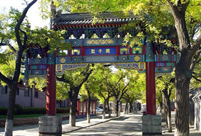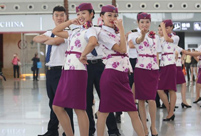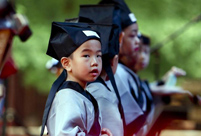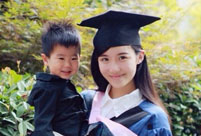 Global ambassadors of ecotourism gather in Nanjing
Global ambassadors of ecotourism gather in Nanjing
 Taiwan woman marries into Kazak family, 100 sheep plus a flat as dowry
Taiwan woman marries into Kazak family, 100 sheep plus a flat as dowry
 College girls take graduation photos under water in Chongqing
College girls take graduation photos under water in Chongqing
 Cartoon: Xi and football
Cartoon: Xi and football
 Chinese influence sweeps ROK
Chinese influence sweeps ROK
 Post-90s beauty boxer grapples four men
Post-90s beauty boxer grapples four men
 3,000-year-old tea town through lenses
3,000-year-old tea town through lenses
 22 archaeological sites along Silk Road in China
22 archaeological sites along Silk Road in China
 Football babies, Samba dancers embrace 'World Cup'
Football babies, Samba dancers embrace 'World Cup'
 Beautiful scenery along China’s Grand Canal
Beautiful scenery along China’s Grand Canal
It's very important for Japan to step back from historical revisionism as have been seen under Prime Minister Shinzo Abe so as to achieve better relations with its neighbors, especially China, said Hugh White, a renowned Australian strategist.
In a recent interview with Xinhua, White, who had served as senior advisor to defense minister and prime minister in the 1980s and 90s, said it will be very difficult to stabilize and improve Japan's relations with China unless Abe and other Japanese political leaders put this kind of historical revisionism behind them.
"I think many people in Australia as in China or South Korea or elsewhere in Asia find it surprising and disturbing that Japanese political leaders like Abe want to revisit these issues in the way that he has. That's a very significant factor."
Meanwhile, China needs to find ways to reassure Japan about the latter's position in Asia in the coming decades.
"Japan is going to have to find a way to live with the fact that China is now a bigger and stronger country."
"It's a mistake for Japan to try to seek security from China's growing power by clinging more and more closely to the United States, and trying to build a coalition with the U.S. and with other countries in Asia to resist and contain China's growing power."
"That's a kind of idea that Mr. Abe has on mind. But I think it 's a wrong idea." White finds it a significant move in the evolution of Japan's strategic policy in Japan's decision earlier this month to reinterpret the constitution to allow Japan to undertake collective self-defense activities.
"I think there are two separate reasons. The first is that it reflects Prime Minister Abe's views of Japan, politically and ideologically, that Japan should remove itself from the post-war constraints of its pacifist constitution and become a more normal country. The second factor also reflects Japan's concerns about its own security in Asia as China rises."
White said as China's power grows, the international order in Asia will change in a very fundamental way, with China playing a bigger role and the United States almost certainly playing a smaller role.
"I don't think that gives Japan the right to return to militarism. I don't think it makes it sensible for Japan to revisit historical questions which should be settled decades ago," White said.
"I don't think it'll work for Japan to cling to the old order, to cling to the United States and hoping the United States will protect them from China. On the other hand, I don't think it makes any sense for Japan to try and build some kind of a coalition of its own to resist China's power. I think it's gonna be some different model."
He does not expect the Japanese decision to affect the situation militarily very much because "although Japan has a very formidable armed forces in some ways, particularly its navy and air forces, it will not make any difference to the actual military balance between the U.S. and China in the western Pacific."
 Featured hutongs in Beijing
Featured hutongs in Beijing Separate college entrance exam
Separate college entrance exam Flash mob dance
Flash mob dance Picturesque scenery of Ghost City
Picturesque scenery of Ghost City Children attend First Writing Ceremony
Children attend First Writing Ceremony Female master poses for graduation photos with son
Female master poses for graduation photos with son Silk Road, China's Grand Canal listed as World Heritage Sites
Silk Road, China's Grand Canal listed as World Heritage Sites PKU students imitate famous paintings in real-person photos
PKU students imitate famous paintings in real-person photos Chinese 'Slumdog Millionaire'
Chinese 'Slumdog Millionaire' Islands in S. China Sea better shown on new vertical atlas of China
Islands in S. China Sea better shown on new vertical atlas of China Girl takes father’s portrait to travel the world
Girl takes father’s portrait to travel the world Images of Xi'an: Part one
Images of Xi'an: Part one In Pictures: Female fans of World Cup
In Pictures: Female fans of World Cup Top 20 hottest women in the world in 2014
Top 20 hottest women in the world in 2014  China's top 10 representative architectures
China's top 10 representative architecturesDay|Week|Month